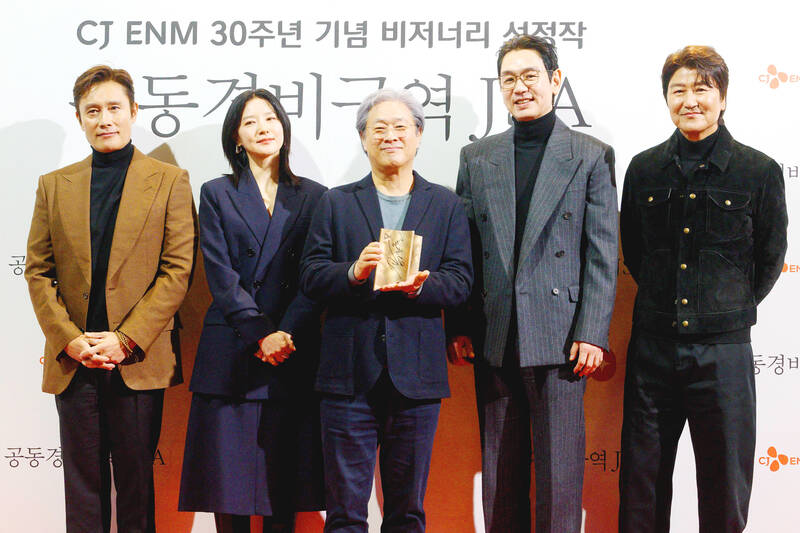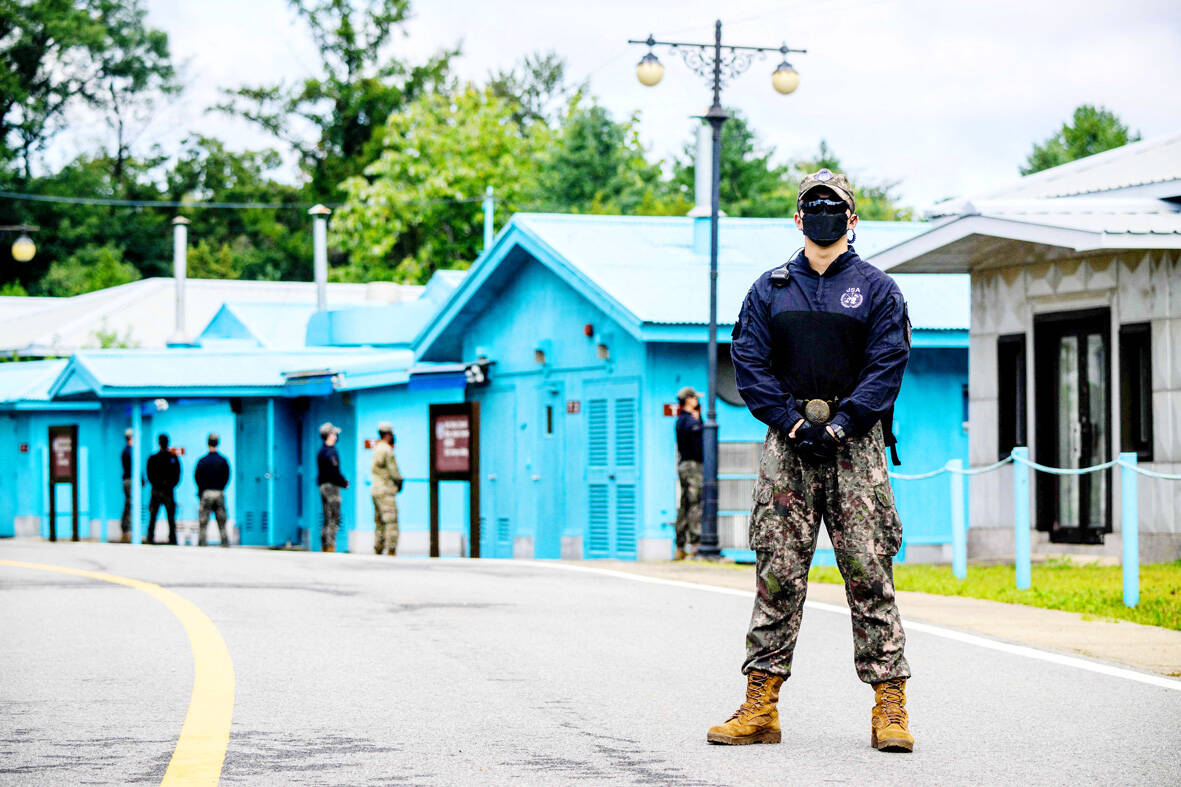Twenty-five years ago, director Park Chan-wook risked jail to make a movie about friendship between North and South Korean soldiers, striking box office gold and beginning his actors’ ascent to global stardom.
Relations between the two Koreas have since plunged, with Pyongyang renouncing its long-held goal of unification and last week destroying a venue that traditionally hosted reunions of families separated by decades of divisions.
Park said his smash hit Joint Security Area still strikes a chord a quarter of a century later.

Photo: AFP
“It is a sad reality that this movie’s themes still resonate with the younger generation,” he told reporters in Seoul this month.
“I hope that by the 50th anniversary, we will be able to discuss it as just a story from the past.”
The film is widely regarded as a masterpiece of South Korean cinema and its cast members have gone on to wider success, including Squid Game actor Lee Byung-hun and Song Kang-ho from Oscar-winning Parasite.

Photo: AFP
But when he set out to make it, Park — best known today for action thriller Oldboy and mystery romance Decision to Leave — was far from a prominent director. His first two feature films flopped. Desperate for success, Park delved into one of the most sensitive topics: the decades-long division of the Korean peninsula.
At the time, Park feared that his tale of inter-Korean bonding could fall foul of laws banning the “glorification” of the communist-run North.
“We prepared ourselves” for the prospect of being jailed, he told reporters.
SMASH HIT
But history was on his side.
Three months before the film’s September 2000 release, then-South Korean president Kim Dae-jung held a historic summit with his North Korean counterpart Kim Jong Il in Pyongyang.
Against the backdrop of that reconciliation, Joint Security Area swept almost all domestic film awards that year. It was also nominated for best film at the Berlin film festival and became South Korea’s highest-grossing movie up to then.
Actor Lee, now one of South Korea’s biggest stars, said he was so thrilled by its success that he watched it 40 times in the cinemas to see the audience reactions.
Local media even reported that Kim Jong-il — a known film buff — had seen it.
The film is set in the eponymous Joint Security Area, located inside the Demilitarized Zone, the 250-km-long strip of land that divides the Korean peninsula.
It is among the most heavily fortified areas on the planet — and the only place where soldiers from the North and South stand face to face.
The tragic film tells the story of secret friendships that form after two North Korean troops assist a South Korean soldier who accidentally steps on a landmine, leading them to bond over South Korean pop music and chocolate desserts.
BREAKING BARRIERS
“Before Joint Security Area, portraying North Korean soldiers in South Korean cinema was somewhat considered taboo,” said Nam Dong-chul, a film critic and chief programmer at the Busan International Film Festival.
“This film broke that barrier by depicting ordinary and relatable North Korean soldiers,” he said.
“At the same time, it was a successful and well-crafted blockbuster, marking a significant advancement in the history of Korean cinema.”
South Korea has since established itself as a global cultural powerhouse. Some credit Joint Security Area with laying the groundwork.
The film was a “driving force behind the creation of films in the Korean cinema industry that combine the director’s artistic vision with commercial viability,” said Jerry Kyoungboum Ko, head of film business for CJ ENM, the South Korean studio that distributed the movie.
The real-life JSA has since been a site of both reconciliation and tragedy.
North Korean leader Kim Jong-un met with then-South Korean president Moon Jae-in there in 2018. The following year, Kim also shook hands with US President Donald Trump across the division line.
But it also saw North Korean soldiers open fire during a defection by one of their comrades in 2017. And in 2023, troops were re-armed on both sides of the JSA, breaking an inter-Korean military pact signed during more optimistic times.
Park said he is often asked when the film is shown abroad if it was shot at the real-life JSA, also known as Panmunjom.
“I would always respond by saying that if we could have filmed at the actual location, this film might not have been necessary at all.”

Google unveiled an artificial intelligence tool Wednesday that its scientists said would help unravel the mysteries of the human genome — and could one day lead to new treatments for diseases. The deep learning model AlphaGenome was hailed by outside researchers as a “breakthrough” that would let scientists study and even simulate the roots of difficult-to-treat genetic diseases. While the first complete map of the human genome in 2003 “gave us the book of life, reading it remained a challenge,” Pushmeet Kohli, vice president of research at Google DeepMind, told journalists. “We have the text,” he said, which is a sequence of

On a harsh winter afternoon last month, 2,000 protesters marched and chanted slogans such as “CCP out” and “Korea for Koreans” in Seoul’s popular Gangnam District. Participants — mostly students — wore caps printed with the Chinese characters for “exterminate communism” (滅共) and held banners reading “Heaven will destroy the Chinese Communist Party” (天滅中共). During the march, Park Jun-young, the leader of the protest organizer “Free University,” a conservative youth movement, who was on a hunger strike, collapsed after delivering a speech in sub-zero temperatures and was later hospitalized. Several protesters shaved their heads at the end of the demonstration. A

Every now and then, even hardcore hikers like to sleep in, leave the heavy gear at home and just enjoy a relaxed half-day stroll in the mountains: no cold, no steep uphills, no pressure to walk a certain distance in a day. In the winter, the mild climate and lower elevations of the forests in Taiwan’s far south offer a number of easy escapes like this. A prime example is the river above Mudan Reservoir (牡丹水庫): with shallow water, gentle current, abundant wildlife and a complete lack of tourists, this walk is accessible to nearly everyone but still feels quite remote.

In August of 1949 American journalist Darrell Berrigan toured occupied Formosa and on Aug. 13 published “Should We Grab Formosa?” in the Saturday Evening Post. Berrigan, cataloguing the numerous horrors of corruption and looting the occupying Republic of China (ROC) was inflicting on the locals, advocated outright annexation of Taiwan by the US. He contended the islanders would welcome that. Berrigan also observed that the islanders were planning another revolt, and wrote of their “island nationalism.” The US position on Taiwan was well known there, and islanders, he said, had told him of US official statements that Taiwan had not